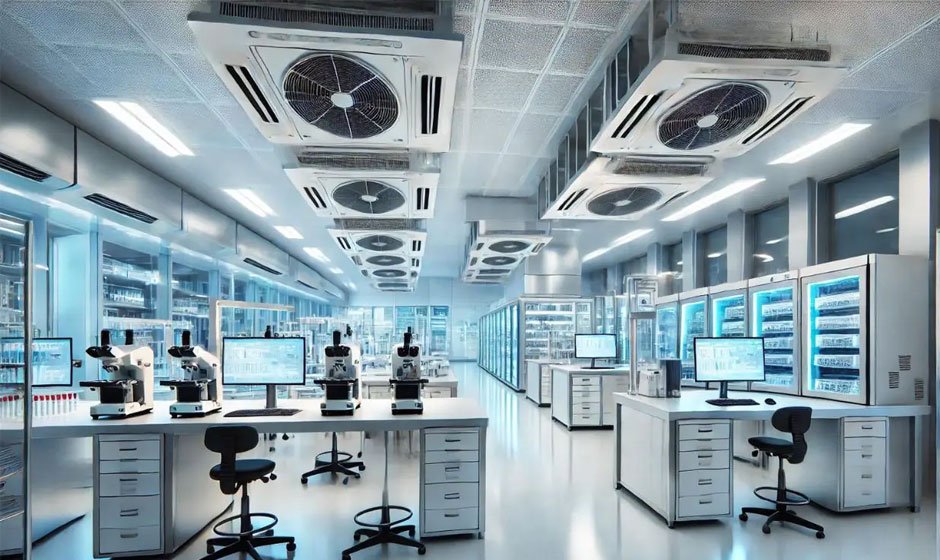Table of Contents
- Introduction to Modern HVAC Solutions
- The Importance of HVAC Systems in the Workplace
- Energy Efficiency in HVAC Technologies
- Improving Air Quality with Advanced HVAC Systems
- Cost Savings and Long-Term Benefits
- Innovative HVAC Solutions and IoT Integration
- Conclusion
Introduction to Modern HVAC Solutions
In recent years, impressive advancements in HVAC (Heating, Ventilation, and Air Conditioning) technologies have created more comfortable, sustainable, and energy-efficient workplaces. Modern HVAC systems provide precise temperature control, improve air quality, and improve employee well-being. High-efficiency units and smart controls enable businesses to meet sustainability goals while maintaining a comfortable work environment.
The Importance of HVAC Systems in the Workplace
Effective HVAC systems are essential for maintaining a pleasant and health-conscious indoor environment. Poor air quality and uneven temperature control can cause allergies, respiratory disorders, and a general decrease in worker productivity, among other health problems. According to a study by the Environmental Protection Agency, improving indoor air quality can significantly reduce absenteeism and bolster employee performance. An effective HVAC system is essential for workers to stay attentive and productive during the workday. Whether you manage a cozy office or a vast corporate building, understanding the importance of a comfortable environment is crucial. One effective way to ensure this is by accessing a reliable heating repair service, which can help maintain an optimal indoor climate. Requiring efficient HVAC systems is essential for creating a favorable work environment that boosts output and contentment among staff members.
Energy Efficiency in HVAC Technologies
One of the most significant benefits of modern HVAC systems is their enhanced energy efficiency. Systems that provide the best possible climate control while consuming the least amount of energy have been designed thanks to advancements in HVAC technology. This dual benefit reduces the environmental footprint of a business and leads to substantial long-term cost savings. Employing energy-efficient HVAC systems can lower energy costs by up to 50%. This reduction in energy use saves money and contributes to a company’s sustainability goals, making it a win-win situation for the business and the environment.
Improving Air Quality with Advanced HVAC Systems
Advanced HVAC solutions have state-of-the-art features that significantly improve indoor air quality. These systems filter out pollutants, allergens, and various harmful particles from the air, making office environments healthier. This feature is particularly beneficial in urban settings where air pollution is a growing concern. High-efficiency particulate air (HEPA) filters, for instance, can capture up to 99.97% of airborne particles, including dust, bacteria, and mold spores. By incorporating these advanced filtration systems, businesses can ensure cleaner, healthier air, directly influencing employee well-being, reducing health-related absences, and fostering a more productive workforce.
Cost Savings and Long-Term Benefits
While the initial investment in modern HVAC systems might be high, the long-term benefits are worth the expenditure. Energy savings alone can offset the initial costs over time. Additionally, modern systems require less frequent maintenance and are generally more durable, leading to lower long-term maintenance costs. Improved employee well-being and productivity also offer significant financial benefits, as healthier employees mean fewer sick days and higher overall productivity. Many governments offer incentives and rebates to businesses that invest in energy-efficient HVAC solutions, further reducing installation costs and enhancing the return on investment.
Innovative HVAC Solutions and IoT Integration
The integration of IoT technology has revolutionized HVAC systems’ capabilities. Innovative HVAC solutions enable remote monitoring and control, allowing businesses to optimize their energy use and maintain ideal indoor conditions. IoT-enabled HVAC systems can also predict maintenance needs by analyzing real-time performance data. This predictive maintenance feature helps prevent unexpected system failures, reducing downtime and the need for emergency repairs. Additionally, innovative HVAC systems can adjust their operation based on the number of occupants and outside weather conditions, ensuring that energy use is continually optimized.
Conclusion
Innovative HVAC solutions play an instrumental role in transforming the modern workspace. These systems substantially improve air quality and energy efficiency and promote healthier, more productive working conditions. By investing in advanced HVAC technologies, businesses can achieve long-term cost savings and create optimal environments where employees excel. Embracing these innovations is a step forward in creating sustainable and thriving workplaces in an ever-evolving corporate landscape.



